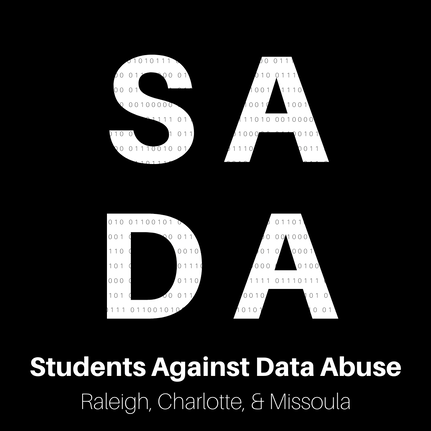Data is our future. It's worth fighting for.
|
The mass collection and analysis of data has allowed for revolutionary improvements in nearly every field of science, including medical research and the development of consumer products. Today, we enjoy many luxuries due to the collection and analysis of our data and advances in computational technology. However, we must also be cognizant of the harm the technology that we enjoy can inflict. As the next generation, we must seek to hold organizations and companies that fail to respect privacy and data rights accountable to the best of our abilities.
|
About SADA
|
The Student Against Data Abuse (SADA) was founded in 2019 by a group of STEM students in North Carolina who decided action needed to be taken to ensure the proper use of data in the Information Age. We hope to effect change through the legislative system, local efforts, and through online outreach to make others aware of injustices involving the wrongful collection or use of data and help to encourage positive uses of data that both lead innovation and respect the rights of users. Today, we have members in Raleigh, Charlotte, and Missoula, and have received support from other students across the world.
|
We live in the age of the algorithm. Increasingly, the decisions that affect our lives—where we go to school, whether we get a car loan, how much we pay for health insurance—are being made not by humans, but by mathematical models. |
What is Data Abuse?
Data abuse is the use of information that infringes upon an individuals rights and/or privacy. While this often is associated with online activity, Big Data is increasingly affecting domains of our lives far past the digital world. Higher education, online privacy, credit scores, policing, and even our democracy are just some of the areas impacted by the collection and wrongful use of data.
|
Our Efforts
Our actions to address data abuse focus on public awareness, action in our communities, and bringing awareness to the data policies of major organizations, including both for-profit and non-profit organizations, as well as government agencies.
|
|
Advocating For Privacy in Charlotte
As citizens of Charlotte, we have contacted members of our City Council to help bring awareness of facial recognition and the implications the technology holds for the privacy of the public. We continue to reach out to our Council, and are currently looking for a council member to sponsor legislation that would outlaw the use of facial recognition technology by the Charlotte-Mecklenburg Police Department.
|
Addressing Data Policies in EdTech
In November of 2019, we learned that the College Board participates in the exchange of student data in return for 50 cents per name sold. As two of our members are advisors on the College Board's Youth Advisory Council, it was especially surprising to realize that such transactions had been occurring for years without our knowledge. We are working to answer questions we and other students have, such as why we were unaware our personal information was being sold by an educational non-profit that we place our trust in as students.
|
|
|
|
Bringing Awareness to Misinformation Online
Cambridge Analytica's political operations on social media platforms made it clear that misinformation can have real impacts on democracy. Unfortunately, our elders are most susceptible to misinformation online, so we visited retirement communities in North Carolina to help teach our seniors how to combat misinformation online.
|

